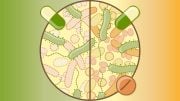
Research demonstrated that the gut microbes found in Tibetan Buddhist monks differ greatly from their secular counterparts and have been associated with reduced risks of anxiety, depression, and heart disease.
Studies link gut microbe diversity in Buddhist monks to reduced risk of anxiety, depression, and heart disease.
A small comparative study recently published in the journal General Psychiatry has found that regular deep meditation, practiced over several years, could regulate the gut microbiome and potentially reduce the risk of physical and mental illness.
A study found that the gut microbes in a group of Tibetan Buddhist monks were significantly different from those of their non-monastic counterparts, and were associated with a reduced risk of anxiety, depression, and cardiovascular disease.
Research shows that the gut microbiome can affect mood and behavior through the gut–brain axis. This includes the body’s immune response, hormonal signaling, stress response, and the vagus nerve—the main component of the parasympathetic nervous system, which oversees an array of crucial bodily functions.
The significance of the group and specimen design is that these deep-thinking Tibetan monks can serve as representatives of some deeper meditations. Although the number of samples is small, they are rare because of their geographical location.
Meditation is increasingly being used to help treat mental health disorders, such as depression, anxiety, substance abuse, traumatic stress, and eating disorders as well as chronic pain. But it’s not clear if it might also be able to alter the composition of the gut microbiome, say the researchers.
In a bid to find out, the researchers analyzed the stool and blood samples of 37 Tibetan Buddhist monks from three temples and 19 secular residents in the neighboring areas.
Tibetan Buddhist meditation originates from the ancient Indian medical system known as Ayurveda, and is a form of psychological training, say the researchers. The monks in this study had been practicing it for at least 2 hours a day for between 3 and 30 years.
None of the participants had used agents that can alter the volume and diversity of gut microbes: antibiotics; probiotics; prebiotics; or antifungal drugs in the preceding 3 months.
Both groups were matched for age, blood pressure, heart rate, and diet.
Stool sample analysis revealed significant differences in the diversity and volume of microbes between the monks and their neighbors.
Bacteroidetes and Firmicutes species were dominant in both groups, as would be expected. But Bacteroidetes were significantly enriched in the monks’ stool samples (29% vs 4%), which also contained abundant Prevotella (42% vs 6%) and a high volume of Megamonas and Faecalibacterium.
“Collectively, several bacteria enriched in the meditation group [have been] associated with the alleviation of mental illness, suggesting that meditation can influence certain bacteria that may have a role in mental health,” write the researchers.
These include Prevotella, Bacteroidetes, Megamonas and Faecalibacterium species, the previously published research suggests.
The researchers then applied an advanced analytical technique to predict which chemical processes the microbes might be influencing. This indicated that several protective anti-inflammatory pathways, in addition to metabolism—the conversion of food into energy—were enhanced in the meditation people.
Finally, blood sample analysis showed that levels of agents associated with a heightened risk of cardiovascular disease, including total cholesterol and apolipoprotein B, were significantly lower in the monks than in their secular neighbors by their functional analysis with the gut microbes.
Although a comparative study, it is observational and the numbers of participants were small, all male, and lived at high altitudes, making it difficult to draw any firm or generalizable conclusions. And the potential health implications could only be inferred from previously published research.
But based on their findings, the researchers suggest that the role of meditation in helping to prevent or treat psychosomatic illness definitely merits further research.
And they conclude: “These results suggest that long-term deep meditation may have a beneficial effect on gut microbiota, enabling the body to maintain an optimal state of health.”
Reference: “Alteration of faecal microbiota balance related to long-term deep meditation” by Ying Sun, Peijun Ju, Ting Xue, Usman Ali, Donghong Cui and Jinghong Chen, 16 January 2023, General Psychiatry.
DOI: 10.1136/gpsych-2022-100893
The study was funded by the National Natural Science Foundation of China.









Sadhguru and Eckhart Tolle have brought this info forward years ago.